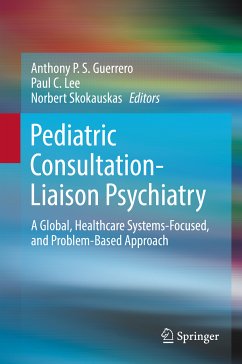
Follow-Up for NICU Graduates (eBook, PDF)
Promoting Positive Developmental and Behavioral Outcomes for At-Risk Infants
Redaktion: Needelman, Howard; Jackson, Barbara J.
Versandkostenfrei!
Sofort per Download lieferbar
136,95 €
inkl. MwSt.
Weitere Ausgaben:

PAYBACK Punkte
68 °P sammeln!
This book examines the role of Neonatal Intensive Care Units (NICUs) and follow-up clinics in addressing the complex developmental, behavioral, social, and medical needs of at-risk infants through early intervention and medical subspecialties. It describes the necessary functional components of follow-up clinics and challenges in establishing and running multidisciplinary clinics in an area of difficult heath care financing. Chapters provide essential guidelines for determining which neonates will need follow-up care, evaluating for neurodevelopmental delays and medical and behavioral impairme...
This book examines the role of Neonatal Intensive Care Units (NICUs) and follow-up clinics in addressing the complex developmental, behavioral, social, and medical needs of at-risk infants through early intervention and medical subspecialties. It describes the necessary functional components of follow-up clinics and challenges in establishing and running multidisciplinary clinics in an area of difficult heath care financing. Chapters provide essential guidelines for determining which neonates will need follow-up care, evaluating for neurodevelopmental delays and medical and behavioral impairment and disability, and estimating how long intervention and further follow-up will be required. Chapters also discuss organization, staffing, funding, testing protocols, and coordination with other programs and care facilities, particularly early intervention and the medical home. In addition, the book offers best practices for fostering optimal development for individual infants and high-riskpopulations while raising standards for neonatal care and creating a smooth transition to appropriate subsequent care.
Topics featured in this book include:
Follow-Up for NICU Graduates is a must-have resource for researchers, practitioners, and graduate students in developmental psychology, pediatrics, neuroscience, obstetrics, nursing, and related disciplines.
Topics featured in this book include:
- Developmental care in the nursery.
- Utilizing neonatal brain imaging to predict neurodevelopmental outcomes of NICU infants.
- Genetic considerations in infants with congenital anomalies.
- The HRIF clinic organization model.
- Issues common in neurodevelopmental testing of premature infants.
- The impact of environmental risks, such as parental distress and in-utero drug exposure, to infant neurodevelopment.
Follow-Up for NICU Graduates is a must-have resource for researchers, practitioners, and graduate students in developmental psychology, pediatrics, neuroscience, obstetrics, nursing, and related disciplines.
Dieser Download kann aus rechtlichen Gründen nur mit Rechnungsadresse in A, B, BG, CY, CZ, D, DK, EW, E, FIN, F, GR, HR, H, IRL, I, LT, L, LR, M, NL, PL, P, R, S, SLO, SK ausgeliefert werden.












